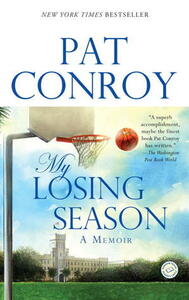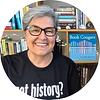Take a photo of a barcode or cover
challenging
emotional
hopeful
inspiring
reflective
medium-paced
It all came full circle in the end. Enjoyed the read even though it was something that I wouldn’t usually pick up. Not an entertainment read, more reflective.
reflective
medium-paced
emotional
reflective
emotional
reflective
sad
medium-paced
This story about Conroy's relationship with this father is emotional and devastating. It shows the complexity and contradictions of love and human relationships. Conroy's writing is amazing, as always.
I didn't expect to like this book, as I don't follow basketball (or really sports at all). But this isn't a basketball story, it's a lovely and poignant coming of age story. It made me want my son, who is just a little tyke now, to know the beauty of being a part of a team.
Lousy story by a hell of a writer
Angry, mean recollection of a college athletic career told play by play and game by game. The man really can write, I bet even a paint brochure written by him would be interesting.
Angry, mean recollection of a college athletic career told play by play and game by game. The man really can write, I bet even a paint brochure written by him would be interesting.
My Losing Season is the first Pay Conroy book I've read, but it definitely won't be the last. With simple but at the same time beautiful language, Conroy describes his late high school years up through his graduation from the Citadel. Individual moments and collections of experiences shape him, his actions, and interactions with others.
Conroy expertly and deftly explores the meaning of losing, because he experienced all facets of it. His physically, mentally and emotionally abusive father told him "you're shit" after he was the high scorer in a great team win, and he had his hoped and expectations dashed the last game of the season when he felt he blew the game.
Anyone who's strived for something and come up short, athlete or not, can relate to the humanity and feeling that Conroy puts in every sentence.
If his other works are as well written and thoughtful as this, I might have just found another favorite author.
Conroy expertly and deftly explores the meaning of losing, because he experienced all facets of it. His physically, mentally and emotionally abusive father told him "you're shit" after he was the high scorer in a great team win, and he had his hoped and expectations dashed the last game of the season when he felt he blew the game.
Anyone who's strived for something and come up short, athlete or not, can relate to the humanity and feeling that Conroy puts in every sentence.
If his other works are as well written and thoughtful as this, I might have just found another favorite author.
I'm not a basketball fan, but adore Pat Conroy and so far I'll read whatever he wants to write about. I would have liked to hear more about his thoughts on writing and some of his experiences as a young man other than those revolving around basketball, but I realize that's not the book he wrote.
Two quotes that I like:
"You do not learn how to write novels in a writing program. You learn how by leading an interesting life. Open yourself up to all experiences. Let life pour through you the way light pours through leaves" (348) Colonel Doyle to Conroy on going to graduate school/The Iowa Writer's Workshop.
"I learned that I had to turn the writer's eye inward to find the gargoyles and stunted trolls that ate me alive. Then, I didn't know that I would build my house of art on my demonic, yet powerless, hatred of my father and my wrecked, guilty love of my fabulous and treacherous mother" (344).
Two quotes that I like:
"You do not learn how to write novels in a writing program. You learn how by leading an interesting life. Open yourself up to all experiences. Let life pour through you the way light pours through leaves" (348) Colonel Doyle to Conroy on going to graduate school/The Iowa Writer's Workshop.
"I learned that I had to turn the writer's eye inward to find the gargoyles and stunted trolls that ate me alive. Then, I didn't know that I would build my house of art on my demonic, yet powerless, hatred of my father and my wrecked, guilty love of my fabulous and treacherous mother" (344).
I love the way Pat Conroy writes, but there was too much basketball stuff in this book. So, I skipped over a lot of the game descriptions and read more about the people, though I had trouble keeping the nicknames of all the team members straight. And what exactly is a point guard? The last few chapters were the most interesting, more about Pat’s family and his novels and the team members and what they’re now doing. I liked this book, but not as much as Conroy’s novels.


